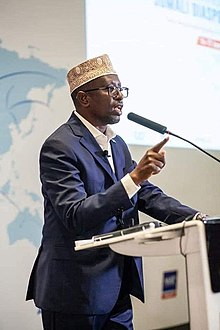
Back شريف شيخ أحمد Arabic Şeyx Şərif Əhməd Azerbaijani Sharif Sheikh Ahmed BCL Шэйх Шарыф Ахмед Byelorussian Sharif Sheikh Ahmed Catalan Šarif Ahmed Czech Sharif Sheikh Ahmed German Σαρίφ Αχμέτ Greek Sharif Sheid Ahmed Spanish Shariif Shiikh Axmed Estonian
This article may require cleanup to meet Wikipedia's quality standards. The specific problem is: Chaotic and fragmented "Presidency" section, summary of presidency and legacy needed in lead. (December 2022) |
Sharif Sheikh Ahmed | |
|---|---|
| شيخ شريف شيخ أحمد | |
 Sharif Sheikh Ahmed in 2021 | |
| 7th President of Somalia | |
| In office 31 January 2009 – 20 August 2012 | |
| Prime Minister | Omar Abdirashid Ali Sharmarke Mohamed Abdullahi Farmajo Abdiweli Mohamed Ali |
| Preceded by | Abdullahi Yusuf Ahmed |
| Succeeded by | Hassan Sheikh Mohamud |
| 1st Chairman of the Alliance for the Re-liberation of Somalia | |
| In office 15 September 2007 – 31 January 2009 | |
| Preceded by | Office Established |
| Succeeded by | Office Abolished |
| 1st Chairman of the Islamic Courts Union | |
| In office 26 June 2004 – 15 September 2007 | |
| Preceded by | Office Established |
| Succeeded by | Office Abolished |
| Personal details | |
| Born | July 25 1965 Mahaday, Somali Republic |
| Political party | Himilo Qaran |
| Alma mater | University of Kordofan |
Sheikh Sharif Sheikh Ahmed (Somali: Sheekh Shariif Sheekh Axmed, Arabic: شيخ شريف شيخ أحمد; born 25 July 1965) is a Somali Politician who served as the 7th President of Somalia from 2009 to 2012. Before his presidency, he became the Chairman of the Islamic Courts Union (ICU) from 2004 to 2007 and the Alliance of Re-liberation of Somalia (ARS) from 2007 to 2009.
In 2004, Sharif became the head of the ICU. By mid-2006, the organization had wrested control of Mogadishu from warlords and expanded territorial control across much of Somalia. This rapid rise prompted a full-scale Ethiopian invasion in late 2006, leading to the ICU's governing body to collapse. In the ensuing military occupation and Islamist insurgency, Sharif assumed leadership of the Alliance for the Re-liberation of Somalia (ARS). Following Ethiopia’s troop withdrawal in January 2009, he was elected President of the Transitional Federal Government (TFG).
Sharif’s TFG administration faced fierce opposition from militant groups like Al-Shabaab and Hizbul Islam, which demanded the withdrawal of African Union troops that had been deployed following the invasion and the full implementation of Sharia law. In early 2009, his government nearly fell to an insurgent offensive in Mogadishu.[1] However, by 2011, his administration—with African Union support—managed to drive Al-Shabaab out of the capital.[2] Despite these gains, Somalia under Sharif's leadership continued to rank as a failed state, struggling with limited popular support and widespread governance challenges.[3][4] By the end of his term, the TFG transitioned into the Federal Government of Somalia (FGS). In the 2012 presidential election, Sharif was defeated by Hassan Sheikh Mohamud.
After his presidency, Sharif founded the Islamic democratic Himilo Qaran political party and later established the Forum for National Parties. He also serves as chairperson of the Council of Presidential Candidates of Somalia.
- ^ "Somalia: The Disintegration of Hizbul Islam?". Stratfor. 2 February 2010. Retrieved 13 December 2024.
- ^ "Somalia's al-Shabab rebels leave Mogadishu". BBC News. 6 August 2011. Retrieved 14 December 2024.
- ^ "Somalia: Failed State and Failing Responses". ISS Africa. Retrieved 14 December 2024.
- ^ "Missed opportunities in Somalia". The New Humanitarian. 13 October 2010. Retrieved 14 December 2024.